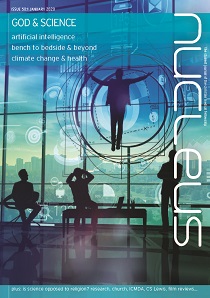Miracles
CS Lewis
304pp, Collins
ISBN: 9780007461257
paperback £8.99
Mediaeval literature expert CS Lewis was no stranger to science, having written the Planetary Trilogy (1) describing voyages to both Mars and Venus and the perils of the National Institute of Co-Ordinated Experiments. (2)
Published in 1947, Miracles deals with philosophical questions that must be addressed before proper consideration of historical evidence is possible. If miracles are thought to be impossible, then no historical evidence is likely to convince the sceptic. So, what does Lewis think is necessary for a miracle to be plausible?
First, there must be more than a 'naturalistic' world. In such a world, any event can be explained because of some other event within the world. Miracles clearly can't happen, but where does such a world leave human thought and reason? If there are only atoms and their movements, aren't our thoughts just consequences of those? If so, can they have any rational meaning at all?
So, if our thoughts are rational, there must be some 'outside input' into such a world. Such input must logically come from an entity independent of the world, otherwise it too would only be a product of events in the world. Such an entity would enable not only reason, but miracles, if it can interact with the world.
So, second, if such a supernatural being exists, it must interact with the world for miracles to be possible. The deist 'god' who creates a world, sets it going, but then withdraws, will not explain this. Neither will a pantheistic model where any supreme being is effectively part of nature, part of the 'system'. But a being who both creates and sustains a universe could logically intervene.
Third, if such a creator-sustainer being exists, is it probable that it might perform miracles? If a miracle might appear plausible given what is known about such a being, straightforward, historical evidence is more likely to be convincing. Lewis uses the incarnation as an example: if Christian concepts of a creator and sin are accepted, such an event may not seem quite so unreasonable as first supposed.
Turning water into wine is not unusual; but it takes a grape harvest and a lot of hard work. Should it surprise us that the creator can circumvent the usual process? (3) Such 'old creation' miracles seem plausible; but we also see 'new creation' miracles — such as the resurrection of Jesus. Something that would not naturally happen occurs. It seems odd, yet in fact it prefigures something that will happen in the new creation. It is a foretaste of something God will do, and no less plausible than an 'old creation' miracle.
This book reminded me that God is bigger than we think. We often hold a narrow view of him that underestimates his role in sustaining every moment of our being. Were we to understand him better, miracles would not pose such an intellectual difficulty.
This book may not be the easiest reading for the non-philosopher, with a medically inclined brain which may need extra time and space for the existential thinking needed. Such investment would not be wasted: Lewis' work will not only help you answer friends' questions, but expand your view of God.Laurence Crutchlow is CMF Associate Head of Student Ministries and GP in London
































